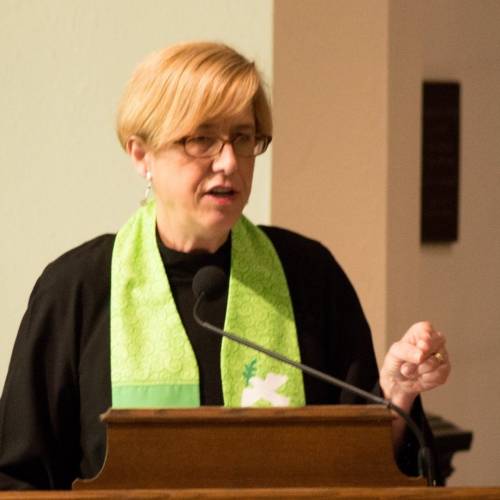Mind the Gap
Closing the space between our values and actions
By Susan Rothenberg

A photo from the London Underground reminding riders of the gap between the platform and the rail car. The gap can trip people up.
When my son and I visited London for the first time a few years ago, he was completely fascinated by the London Underground. For weeks prior to our trip, he researched stations, lines, and pretty much had the whole system map memorized before we stepped on the plane. I was delighted to let him be my guide in navigating London’s public transportation system. As part of my briefing, my son told me the most important thing to remember is, “mind the gap.”
If you’ve ever been a passenger on the London Tube, you are familiar with the ubiquitous “mind the gap” announcement that blasts through the public-address system every time a train pulls into a station. There are warning signs to “mind the gap” posted all over the stations and on the platforms where passengers line up to board.
“Mind the gap,” means to be mindful of the gap between the platform and the train, so you don’t get tripped up as you are boarding or disembarking.
In our work with congregations in the Unglued Church project, my colleagues and I often counsel that taking time to “mind the gap,” is a vital practice for church leadership. Too often, we as leaders do not acknowledge the gap between the congregation’s stated values and its actions. Very often, it is that “gap” which trips up congregations as they seek to serve Christ’s mission in the 21st Century.
One of the most frequent examples of these “gaps” we see is a congregation who says they are welcoming to everyone, yet worships in a facility that cannot comfortably accommodate people in wheelchairs or who are disabled in other ways.
There are many others gaps we have observed:
- A church who wants to attract more young people, but has no social media presence or neglects to regularly update its website.
- A church who values multiculturalism and diversity, but whose worship services include only traditional hymns accompanied by classical organ music.
- A church who values community outreach, but has very few people in the congregation who live in the community.
- A church who values mission, but spends a high percentage of its income on pastoral staff and building maintenance to serve the needs of church members.
- A church who values Scripture, but only a small percentage of members attend adult education classes or Bible study.
Many of Paul’s epistles are rooted in the apostle’s observation of gaps between what the fledging Christian churches say they believe and how they behave. In a recent lectionary passage, 1 Corinthians 1:10-18, Paul speaks to the quarrels that plague the church because many of the people say they are followers of Jesus, yet behave as though they are following Paul or Cephas or Apollo. In his calls for unity, Paul encourages the church to mind the gap between their beliefs and behaviors, and be of one mind and purpose in Jesus Christ. Jesus points out similar discrepancies in the Pharisees who do not practice what they teach in such texts as Matthew 23 and its series of “Woe” statements. The Pharisees have their belief system down pat, yet their actions do not line up with their faith.
There is an old joke (maybe it’s not a joke) about the person who tells a minister, “I don’t go to church anymore because it’s full of hypocrites.” The minister responds, “Oh, we’re not full. There’s always room for at least one more.”
I mention this joke in the spirit of love and understanding because I confess my faith is also riddled with gaps between what I profess and what I practice. I profess to be called by Jesus to love my enemies, yet I too often indulge in quietly delicious schadenfreude when someone I have difficulty loving suffers a misfortune. I take pride in the long laundry list of church-y tasks I manage to get done, but deep down I know it is the difficult and undone soul work that is far more interesting to Jesus.
When churches feel “stuck,” it is almost always because they have become trapped in the gap between their values and their actions. As Paul knew and Jesus taught, being mindful of our gaps is our most crucial work. Identifying gaps is not usually difficult, but closing them is often excruciating because we must undergo significant transformation in order to bring our values and practices into balance.
The good news is we can be joyful in doing this work, because we will find Jesus standing in the gap, greeting us with open arms, inviting us to step out in faith to align our values and our practices in healthy, helpful and holy ways for the sake of the Gospel. A constant practice of mindfulness is essential not only for healthy, vital congregations, but also for each one of us who claim to be disciples of Jesus Christ.
Where are the gaps in your congregation of which you need to be mindful? How is Jesus calling you to align your values and practices?
 Susan Rothenberg is a leader in the Unglued Church Project and an at-large member of Pittsburgh Presbytery. Formerly, she has served as pastor to a small church in Pittsburgh, and currently co-moderates the presbytery’s Commission on Ministry. Prior to entering ordained ministry, she worked in marketing, advertising and public relations for companies in Baltimore and Pittsburgh.
Susan Rothenberg is a leader in the Unglued Church Project and an at-large member of Pittsburgh Presbytery. Formerly, she has served as pastor to a small church in Pittsburgh, and currently co-moderates the presbytery’s Commission on Ministry. Prior to entering ordained ministry, she worked in marketing, advertising and public relations for companies in Baltimore and Pittsburgh.